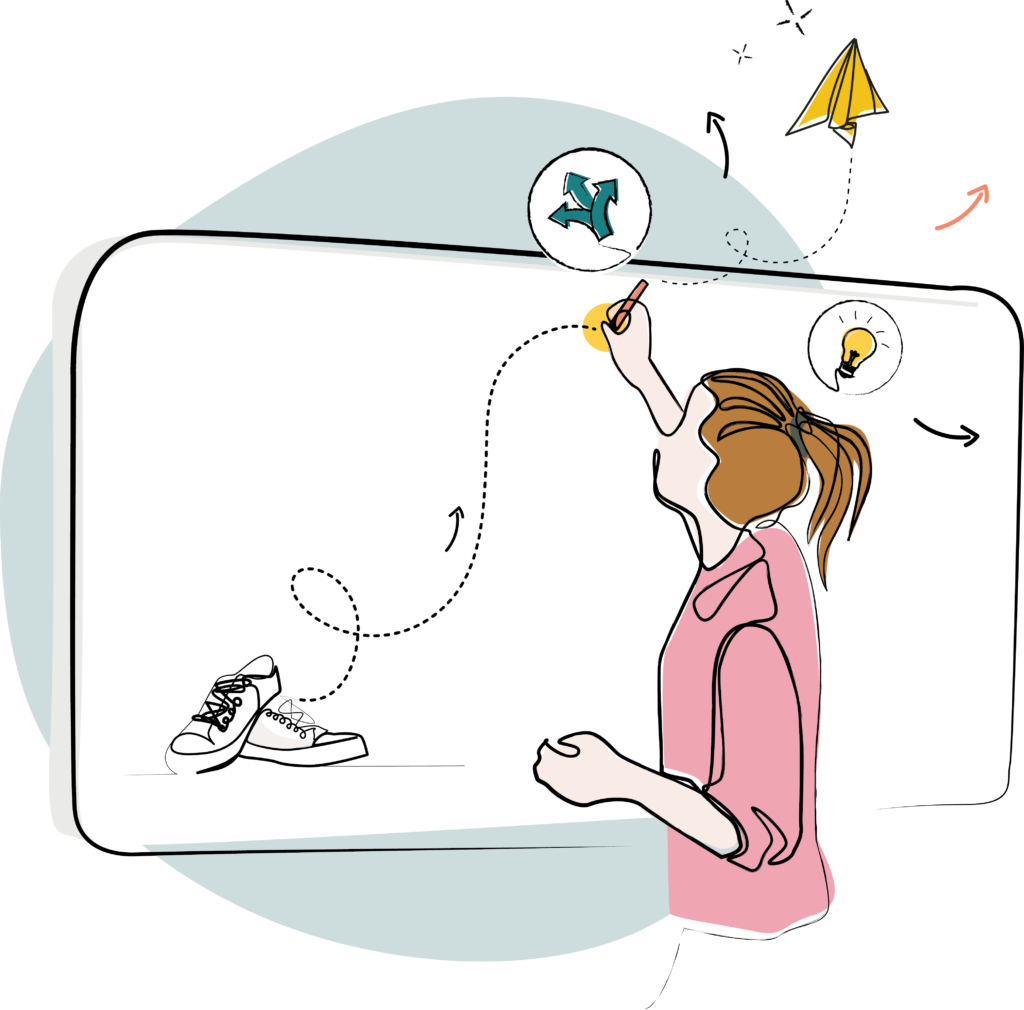Caoimhe Kelly
When I started my career as a shoe designer, I had no idea what I was getting myself into. Or that everything I’d learn working with shoes would set me up with the experience and mindset I needed to embrace a portfolio career – and soon after that a mentoring role at a startup.
Now, I find myself entering a new phase of my career as a consultant and an entrepreneur, something that never would have happened if I hadn’t joined The Portfolio Collective. It really goes to show how far community, connection and a clear sense of purpose can take you.
How I went from shoe designer to entrepreneur
I did my degree in industrial design; a specialism I landed on based on my love of art and a desire to build things. I wanted to work closely with engineers, to collaborate with business and finance teams and, ultimately, to be part of the creative and practical process of manifesting a product or a solution into a physical form.
This was the dream. It didn’t really matter what the product was, so long as it served a purpose, was functional, beautiful and did something good for people.
And if there was the potential to do it freelance à la Carrie Bradshaw, all the better.
My journey with footwear, however, took me down a surprising path. As much as I loved the idea of being a designer, I wasn’t naturally gifted at sketching. So much so that I was asked to leave my course in the second year. That was a knock to my confidence that still niggles, but it implanted in me a growth mindset long before I came to know what that meant and an element of grit, or stubbornness, in staying on.
I started out on an MA placement designing girls’ shoes. For the first month all I was allowed to do was draw. All day, every day. Luckily, my new boss wasn’t phased by my scratchy sketches and wobbly lines. She showed me to my desk, dropped a mound of shoes by my chair and asked me to draw them, all of them, from every angle. This simple request gave me the space and time I needed to practice a fundamental design skill for the first time without judgement. It made me realise that there will always be something to learn and improve on, and that’s not something to be ashamed of or hide.

As a kids’, and later a womens’, shoe designer I held a number of freelance roles, maternity covers and side gigs. I only had two stints in true full-time employment, both of which resulted in me being made redundant or, as the latter company put it, eliminated.
To me, the risk in permanent roles was always much higher. I was never fired from a freelance or temp job, in fact I fell into the permalance trap more than once.
My freelance work spanned across classic footwear brands, high-street stalwarts, fast-fashion, suppliers and sustainable global brands. I got to work across cultures – traveling through Asia, Europe and the US – and had to adjust to remote work long before the pandemic hit.
These experiences shaped the transferable skills that would underpin my transition into consulting and the startup world – skills like collaboration, emotional intelligence, the ability to fail and move forward, to understand constructive criticism and, of course, that oh-so-fundamental growth mindset.
Why there’s never been a better time to work with startups
According to Forbes, the pandemic has fueled their global growth. In the US, there were over half a million new business applications in 2020, most of them for one-person companies. In France, 84,000 new organisations were registered the same year. The UK saw a 30% increase in registered companies. In Japan, new business shot up by 14%. The numbers are astounding – driven by people’s desire for independence.
For me, 2021 was the perfect time to explore a new avenue in my portfolio of work – startup consulting. The Portfolio Collective gave me the tools I needed to connect with founders and I entered my first stint as a consultant helping to shape the direction of a new startup.
The fact is that portfolio professionals across the world are finding new ways to define the shifting future of work by collaborating with innovative startups (or launching their own). It’s more achievable than ever before, which is why I wanted to share my experience and inspire readers like you to take the same leap I did. Here are a few tips I learned along the way to help you get started.
1. Find your community
I found The Portfolio Collective early on in my journey and I can honestly say that it’s been fundamental to my progression as a portfolio professional. The idea of going it alone is daunting. There’s so much to learn and so many pitfalls to avoid. Who knows who you might connect with – they could just be the introduction you needed to the startup world.
Becoming part of a community of like-minded individuals and networking with professionals with diverse career paths is actually the best way to uncover the skills that resonate across industries. Also, people are great. The amount of open, honest feedback and guidance I’ve received through the workshops, masterclasses, weekly check-ins and networking calls is immeasurable both in volume and impact. If you’d like to get involved, you can check out some of the events The Portfolio Collective have going on here.
2. Be intentional and purpose-driven
Take your time getting to know new clients and collaborators. Do your values align? Will this role benefit you, your career or development? Does it further your aspirations? Is it something you believe in and enjoy?
Portfolio careers put you in control and that means you get to choose who you work with. I’ve found many startups – especially new ones – to be purpose-driven and socially conscious, which is one of the reasons I was drawn to them.
3. Get comfortable being uncomfortable
It’s where the best things happen. Don’t be afraid to have the difficult conversations with your clients and yourself. When you choose to work with a startup, you do so because something about that business speaks to you. So if there is a sticking point or you disagree over something, hash it out and be open to solutions you may not have considered.
Sometimes, you wind up right back where you started, but simply having those hard conversations helps build confidence. That collaborative approach will teach you so much.
4. Be agile
In any small business or startup, there are less people to get the work done. Don’t shy away from taking on tasks that are not part of your job description – embrace them! Of course, this doesn’t mean you should do more work than you’re getting paid for, but consider the learning opportunities available to you. If you’re launching your own startup, collaboration and teamwork is key. If you’re doing contract work for a startup, think about the different ways you can support them that they may not have thought of.
It’s all part of entrepreneurship and team-building. Even if the project doesn’t quite take off, or you find yourself pivoting, the learnings will be invaluable.
Embracing entrepreneurship through a portfolio career

The decision to pursue a portfolio career was a simple one for me. That didn’t mean I knew what I was doing or how I’d get there, it was just the logical next step after being made redundant mid-pandemic and relocating back to the UK.
I was at a point in my career where I felt siloed and frustrated by corporate life and was ready to move into leadership and consultancy roles. I wanted to work exclusively with small businesses and startups focusing on eco-responsibility. My portfolio career allowed me to build those parameters and find others that shared the same interest as me.
Portfolio professionals are inherently entrepreneurial, and as such, the perfect match for startups. I would encourage everyone to have a startup as part of their portfolio, and I would encourage more startups to make the most of this growing breed.
Our backgrounds may not always be the obvious choice for certain leadership roles, but isn’t that the point?
Think this sounds like the right path for you? Come along to our monthly Community Welcome Call for new members to find out what a portfolio career could look like and how The Portfolio Collective can help you take those first steps towards professional success – and don’t forget to connect with our community!





